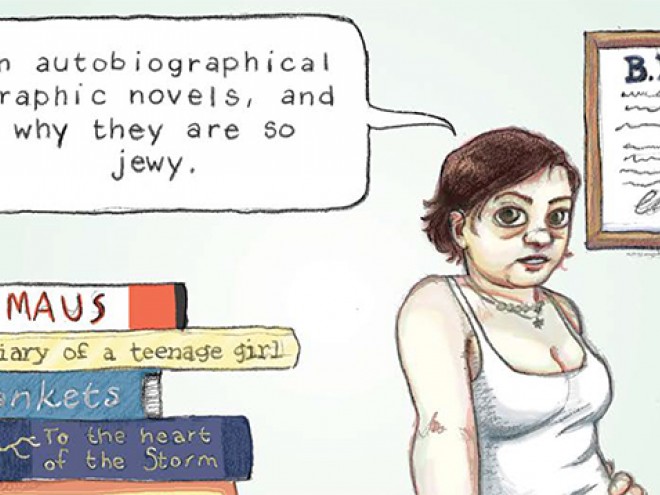Miriam Libicki manages to both draw and encompass every kind of Jew in her collection of graphic essays, Towards a Hot Jew. From hot to awkward, Sephardi to Ashkenazi, Jewish comic artists to renowned Jewish philosophers and politicians, Libicki portrays an array of authentic Jewish peoples in several contexts of history.
Throughout Libicki’s personably narrated graphic essays, she illuminates the confusion of nationalists, youth, and outsiders in topics concerning expression through art, the social constructs and conflicts of Israel, and the exploration of what it means to be Jewish. Even though the subjects are divided into their own condensed graphic essays, they are able to relate to one another under the colossal umbrella of the lives of Jewish peoples.
Aside from Libicki’s autobiographical essay, she does not pose as an expert on any of the ideas, historical recounts, or concepts she puts forth. She humbly takes to interviewing people, in which we mostly gain perspective by way of others’ opinions and first-hand experiences. The interviewees are presented as far from glorified, all-knowing and moralistic, which gives the essays their authenticity. In fact, many show signs of confusion and resentment towards their roots and environment, especially in the “Stranging the Welcomer” essay, in which Ethiopian Jews explain how hard they had to prove themselves as Israeli. “Whenever I knew something the teachers were surprised because I am Ethiopian” Shula Mola, Chairwoman of the Israel Association for Ethiopian Jews, shares. “I wanted to go to university. But they expected us to become nothing more than cleaners.”
The compilation of what others have to say drives the points home in the different essays. The vocalized topics range from the experience of an Ethiopian Jew post-Operation Solomon to the fetishization of soldiers in the Israeli Defense Force (IDF) to deeply devoted Israeli citizens who are no longer sure why they stay. These heavy issues are lightened with Libicki’s ubiquitous cartoon of herself, piping in with both serious and witty reflections of her own: “This racism isn’t 50 years out of date, it’s 200! Fuck, Israel. Why are you being so stupid! You’re blowing it for all of us!”
The people Libicki talks to are illustrated genuinely not only through their sentiments, but also through the actual illustration of them. The author draws out face expressions that depict feelings of nostalgia, melancholy, and of misplacement through soft and harsh tones in watercolor and graphite. These drawings give real dimensions to people that allow us to interpret what face expressions and body language means. Libicki’s ingenuity also applies to herself through her autobiography, where she discusses comic autobiographies as well as what it’s like to be a Jewish graphic artist and a Jewish woman.
Libicki uniquely explores a plethora of subjects through refreshingly diverse forms of narration and illustration in which the topics transcend beyond its face-value. We find ourselves pondering the root of human motivation, the effects of nationalism on the outsider, and self-perpetuating stereotypes, all of which helps us understand the lives of Jewish people in both a historical and global context.
Michelle Zaurov is Jewish Book Council’s program associate. She graduated from Binghamton University in New York, where she studied English and literature. She has worked as a journalist writing for the Home Reporter, a local Brooklyn publication. She enjoys reading realistic fiction and fantasy novels, especially with a strong female lead.





